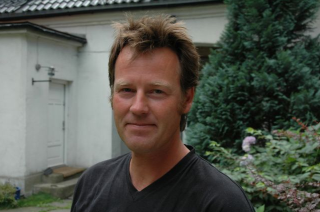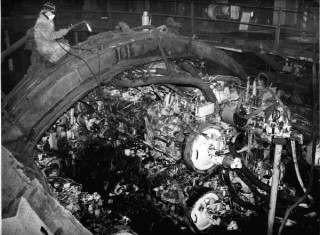
New Managing Director for Bellona Norway
The Board of the Bellona Foundation has appointed former Minister of Climate and the Environment Sveinung Rotevatn as Managing Director of Bellona No...
News

Publish date: January 20, 2015
News
Russia has reportedly ended all cooperation with US Department of Defense personnel who have worked to protect the country’s nuclear facilities and stockpiles since shortly after the collapse of the Soviet Union, the Boston Globe reported.
The move seems to signal a total freeze-out of the US military’s cooperative activities with Russia geared toward destroying Cold War legacy weapons of mass destruction and securely storing nuclear weapons and materials stockpiles as the Government of Vladimir Putin continues his backward march from any perceived western influence.
At the center of the now-scrapped nuclear security pact is the Cooperative Threat Reduction (CTR) Program, also known as Nunn-Lugar, so named for the two former US senators, Sam Nunn and Richard Lugar, who brokered the arrangement in 1991.

But, a combination of Putin’s acute suspicion of foreign meddling – as evidenced by his “foreign agent” law on NGOs – plus East-West antagonisms and sanctions arising from his military incursions into Ukraine, took much of the surprise out of the program’s trashing.
The newspaper said the decision was made in mid-December when representatives from the US and Russia met secretly in Moscow for two days of talks.
The meetings were attended by some 40 people, including staff from the US Department of Energy, its nuclear weapons labs, the Pentagon, and the State Department, and Russian officials who oversee a gamut of programs from dismantling nuclear submarines to arms control.
At the meetings’ conclusion, on December 16, both sides signed a three-page declaration ending the cooperation agreement on New Year’s Day, the Globe said. The program’s cancellation was not made public until it earlier this week.
What is lost with Nunn-Lugar
At stake with the Nunn-Lugar’s cancellation are security upgrades to at some of Russia’s seven closed nuclear cities, which house the country’s largest stockpiles of highly enriched uranium and plutonium, according to anonymous officials who spoke with the Globe.
US-Russian joint work to boost security at 18 civilian facilities where weapons materials are stored also ended, effective January 1, and projects to convert highly enriched uranium into less weapons-ready form at two other nuclear facilities has also ceased, said the paper.
Also likely to lapse is the planned construction of surveillance systems at 13 buildings storing nuclear materials and other projects to install radiation detectors at Russian broader crossings, airports and ports to interdict potential nuclear smuggling. The Globe report suggested these projects would never get off the ground without US funding assistance.
Russia has contended that it has the money to pay for its own nuclear security and dismantlement projects, and with Putin’s third ascent to the presidency in 2012, such declarations only became more insistent.
Bad time to lower the CTR umbrella
US officials who spoke with the Globe insisted that remaining weapons stockpiles in Russia are sufficient to make hundreds of nuclear bombs.
David Huizenga, a nonproliferation expert at the US National Nuclear Security Administration, was identified by Russia Today, an English-language mouthpiece for the Kremlin, as the leader of the US delegation in December.
The outlet quoted Huizenga as saying: “We are encouraged that they [the Russians] stated multiple times that they intend to finish this work.”
Nils Bøhmer, Bellona’s executive director, however, was disappointed and said far too much work remains for Nunn-Lugar to be abandoned.

“Even though the CTR-program have been secured huge amounts of nuclear material in Russia, there is still a need for such efforts to continue,” he said. “There must be a constant focus on the safekeeping of the surplus amount of nuclear material in Russia for decades to come – even if Russia recently has made progress in this work, there is still the need for international assistance.”
Dr Edwin Lyman, an expert on nuclear nonproliferation at Washington’s Union for Concerned Scientists told Bellona by phone that he thought Russia could continue the nonproliferation work on its own, “but whether it will have the initiative to is questionable,”
“Politics aside, the United States offered Russia a sounding board in dealing with these issues. Now that’s gone,” Lyman said. “Russian doesn’t appreciate the seriousness of its stockpile of plutonium – if they continue security efforts by themselves things will continue to fall off and they’ll get sloppy.”
Kenneth Luongo, president of the Partnership for Global Security, told Bellona by phone that Nunn-Lugar had left an infrastructure in Russia, “but whether they can sustain a modern system of security or let it slide can’t be forseen.”
“We will probably end up somewhere in the middle,” Luongo said. “It’s US equipment and it needs to be maintained, and I hope they sustain the investment.”
Nunn-Lugar’s achievements
Nunn-Lugar has been immensely effective since its inception, and geared activities toward helping destroy hundreds of nuclear weapons and nuclear powered submarines.
It also paid salaries for many workers Russia’s nuclear weapons complex to avert brain drain to higher paying rouge nations. It also installed security measures at a variety of weapons materials facilities and trained personnel to use them. The program also facilitated the withdrawal of fission materials and nuclear weapons from former Soviet republics.

Over two decades, Nunn-Lugar was also a bargain, reportedly spending $2 billion on its accomplishments. Another $100 million was allocated for 2015 and the US has planed to continue programs until at least 2018.
Political tea leaves pointed to programs demise
Though a majority of projects envisioned under CTR have long been completed – such as intercontinental ballistic missile launching submarine dismantlement in Russia’s Northern Fleet –its cancellation was facilitated by an ugly political climate.
“Nunn-Lugar was not political and now its been politicized,” said Luongo. “One thing you don’t want to screw around with and politicize is things that can blow up pieces of cities and countries.”
As early as October 2012, Russia’s Foreign Ministry said it would not renew Nunn-Lugar without major but unspecified changes.
The program’s renewal was cast into further doubt when The New York Times quoted Russian Defense Minister Sergei Shoigu in November as saying the program would be scotched, Luongo said.
For his part, Sergei Kiriyenko, head of Russia’s state nuclear corporation made repeated assurances that decisions made in the nuclear sphere are long-term and lie outside politics, according to Russia Today’s recounting.
But Luongo said, “This was Russia’s decision and theirs alone.”
“It was not a surprises but it is the end of era,” Loungo told Bellona. “It can be sustained but I am worried about the political implications that [Nunn-Lugar] was a spy operation and not symbol of two nations taking responsibility.”
“It’s clearly meant as an affront to the US, but it’s regrettable to all involved,” he added.

The Board of the Bellona Foundation has appointed former Minister of Climate and the Environment Sveinung Rotevatn as Managing Director of Bellona No...

Økokrim, Norway’s authority for investigating and prosecuting economic and environmental crime, has imposed a record fine on Equinor following a comp...

Our op-ed originally appeared in The Moscow Times. For more than three decades, Russia has been burdened with the remains of the Soviet ...

The United Nation’s COP30 global climate negotiations in Belém, Brazil ended this weekend with a watered-down resolution that failed to halt deforest...